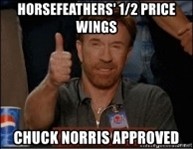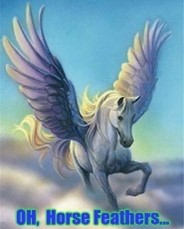Are you looking for a way to call people out on the nonsense they're speaking to you? If so, you could reply with "horsefeathers" when they make an idiotic statement. This post describes the meaning and origin of this expression.
Meaning
The expression "horsefeathers" means that a person is talking rubbish or nonsense, and you want to call them out on their actions. You can use the saying when the other person finishes making their spiel to you, or you could use it to interrupt them and as a means of telling them to go away because you have other things to do.
Horsefeathers, also spelled "Horse feathers," can have a different context in speech. For instance, you could use it as a light, comical way to brush off someone trying to fool you. Or you could use it as a firm warning to someone to get them to stop talking to you.
Horsefeathers is an expression that helps you do away with using foul language in your vocabulary. It's a suitable replacement for many other curse words, and there's no harm in saying it around children.
Example Usage
"Oh, horsefeathers, there is no way it happened like that; you're just making things up to get attention right now."
"That guy is talking total horsefeathers. Someone needs to tell the truth and put him in his place."
"That speech was all promises and horsefeathers. There is no way they stick to those campaign promises after they win the election."
"I think you're talking horsefeathers. You expect me to believe she went out on a school night like that and caused all of that trouble?


Origin
The saying "horsefeathers" originates from the Marx Brothers film "Horse Feathers," which premiered in 1932. The original spelling was in two words, as in "Horse feathers." However, this changed over the decades, and now most people spell it in two separate terms.
It's an American term, and most people don't use it outside of the US, so it doesn't have global appeal. However, the comic strip artist William Morgan de Beck gets the credit for coining the phrase five years before the Marx Brothers film.
The journal "American Speech" officially gave de Beck credit for coining the phrase in its December 1928 issue.
"Mr. William De Beck, the comic-strip comedian responsible for 'Barney Google,' assumes credit for the first actual use of the word horsefeathers."
Billy de Beck also created a cartoon film, "Horsefeathers," appearing in American cinemas in 1928.
Interestingly, Billy wasn't the one responsible for creating the phrase. Etymologist Leonard Zwilling published a dictionary of the works of cartoonist T. A. Dorgan in 1927. In part four of the work, we see the use of Horsefeathers in print for the first time.
"The cashier's department - Bah - Horsefeathers. He wouldn't give you a ticket to see Halley's Comet."
Phrases Similar to Horsefeathers
- Rubbish.
- Nonsense.
- Chatter.
Phrases Opposite to Horsefeathers
- The truth.
- Genuine conversation.
- Facts.
What is the Correct Saying?
- Horsefeathers.
- Horse feathers.
Ways People May Say Horsefeathers Incorrectly
Some people may spell horsefeathers as "horse feathers." While this is the word's original spelling, the more common use of the term is as one word in modern language. The saying has nothing to do with horses or feathers, and it's not a word describing a Pegasus, the mythical Greek horse with wings.
Acceptable Ways to Phrase Horsefeathers
You can use the word "horsefeathers" to replace stronger langue like bullsh*t. It's a way of telling people that they are speaking nonsense and need to stop. Depending on the situation, you can use the term with a strong intention or a comical one. The phrase suits social and professional use. It's a great way to limit the usage of bad language around kids.